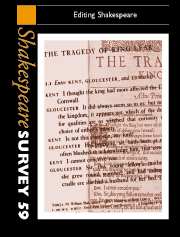Book contents
- Frontmatter
- Editing Shakespeare’s Plays in the Twentieth Century
- Crisis in Editing?
- On Being a General Editor
- Altering the Letter of Twelfth Night: ‘Some are born great’ and the Missing Signature
- ‘A Thousand Shylocks’: Orson Welles and The Merchant of Venice
- The Date and Authorship of Hand D’s Contribution to Sir Thomas More: Evidence from ‘Literature Online’
- Ferdinand’s Wife and Prospero’s Wise
- Editing Stefano’s Book
- Manuscript, Print and the Authentic Shakespeare: The Ireland Forgeries Again
- The Author, the Editor and the Translator: William Shakespeare, Alexander Chalmers and Sándor Petofi or the Nature of a Romantic Edition
- Women Edit Shakespeare
- The Shakespeare Edition in Industrial Capitalism
- Print and Electronic Editions Inspired by the New Variorum Hamlet Project
- The Evolution of Online Editing: Where Will it End?
- The Director as Shakespeare Editor
- The Editor as Translator
- Performance Editions, Editing and Editors
- Editing Collaborative Drama
- Will in the Universe: Shakespeare’s Sonnets, Plato’s Symposium, Alchemy and Renaissance Neoplatonism
- Giants and Enemies of God: The Relationship between Caliban and Prospero from the Perspective of Insular Literary Tradition
- Shakespeare’s Ages
- Who Wrote William Basse’s ‘Elegy on Shakespeare’?: Rediscovering a Poem Lost from the Donne Canon
- ‘Sometime a Paradox’: Shakespeare, Diderot and the Problem of Character
- Shakespeare Performances in England, 2005
- Professional Shakespeare Productions in the British Isles, January–December 2004
- The Year's Contributions to Shakespearian Study 1 Critical Studies
- 2 Shakespeare in Performance
- 3 Editions and Textual Studies
- Index
Will in the Universe: Shakespeare’s Sonnets, Plato’s Symposium, Alchemy and Renaissance Neoplatonism
Published online by Cambridge University Press: 28 March 2007
- Frontmatter
- Editing Shakespeare’s Plays in the Twentieth Century
- Crisis in Editing?
- On Being a General Editor
- Altering the Letter of Twelfth Night: ‘Some are born great’ and the Missing Signature
- ‘A Thousand Shylocks’: Orson Welles and The Merchant of Venice
- The Date and Authorship of Hand D’s Contribution to Sir Thomas More: Evidence from ‘Literature Online’
- Ferdinand’s Wife and Prospero’s Wise
- Editing Stefano’s Book
- Manuscript, Print and the Authentic Shakespeare: The Ireland Forgeries Again
- The Author, the Editor and the Translator: William Shakespeare, Alexander Chalmers and Sándor Petofi or the Nature of a Romantic Edition
- Women Edit Shakespeare
- The Shakespeare Edition in Industrial Capitalism
- Print and Electronic Editions Inspired by the New Variorum Hamlet Project
- The Evolution of Online Editing: Where Will it End?
- The Director as Shakespeare Editor
- The Editor as Translator
- Performance Editions, Editing and Editors
- Editing Collaborative Drama
- Will in the Universe: Shakespeare’s Sonnets, Plato’s Symposium, Alchemy and Renaissance Neoplatonism
- Giants and Enemies of God: The Relationship between Caliban and Prospero from the Perspective of Insular Literary Tradition
- Shakespeare’s Ages
- Who Wrote William Basse’s ‘Elegy on Shakespeare’?: Rediscovering a Poem Lost from the Donne Canon
- ‘Sometime a Paradox’: Shakespeare, Diderot and the Problem of Character
- Shakespeare Performances in England, 2005
- Professional Shakespeare Productions in the British Isles, January–December 2004
- The Year's Contributions to Shakespearian Study 1 Critical Studies
- 2 Shakespeare in Performance
- 3 Editions and Textual Studies
- Index
Summary
Shakespeare’s debt to Plato is often seen as not much more than an acquaintance with the meaning of ‘substance’ and ‘shadow’, relating to ‘ideal’ and ‘real’. A few wider explorations have been made, and more importantly W. H. Auden took the view that ‘the primary experience – complicated as it became later – out of which the sonnets to the friend spring was a mystical one’, of which ‘the classic descriptions . . . are to be found in Plato’s Symposium, Dante’s La Vita Nuova and some of these sonnets’. G. Wilson Knight also referred to the Symposium in The Mutual Flame. I return to Auden’s view later.
Platonic allusions are not prominent in the whole of the Sonnets, which are often the thoughts and feelings of a lover like other lovers, who protests his love, doubts his worthiness, denounces infidelity, is reconciled. There are, however, occasionally surprising phrases: the friend is ‘the grave where buried love doth live’ (31.9), he will ‘pace forth’ against death (55.10), he is ‘a God in Love’ (110.12), the poet ‘hallows’ his name, as though in the Lord’s Prayer (108.8). And there are close resemblances to a passage in the Symposium which speaks of a vision of universal love.
Shakespeare could have read the Symposium in Ficino’s Latin translation, and have discussed it with Ben Jonson, who owned a copy. It takes the form of a banquet, in which each of the speakers hold forth on the nature of Love, the most important being the wise woman Diotima, as reported by Socrates. Diotima denies that Love is merely love between human beings: it ‘includes every kind of longing for happiness and for the good’. It is found not only in poetry, but in business, athletics, philosophy.
- Type
- Chapter
- Information
- Shakespeare Survey , pp. 225 - 238Publisher: Cambridge University PressPrint publication year: 2006
- 1
- Cited by



